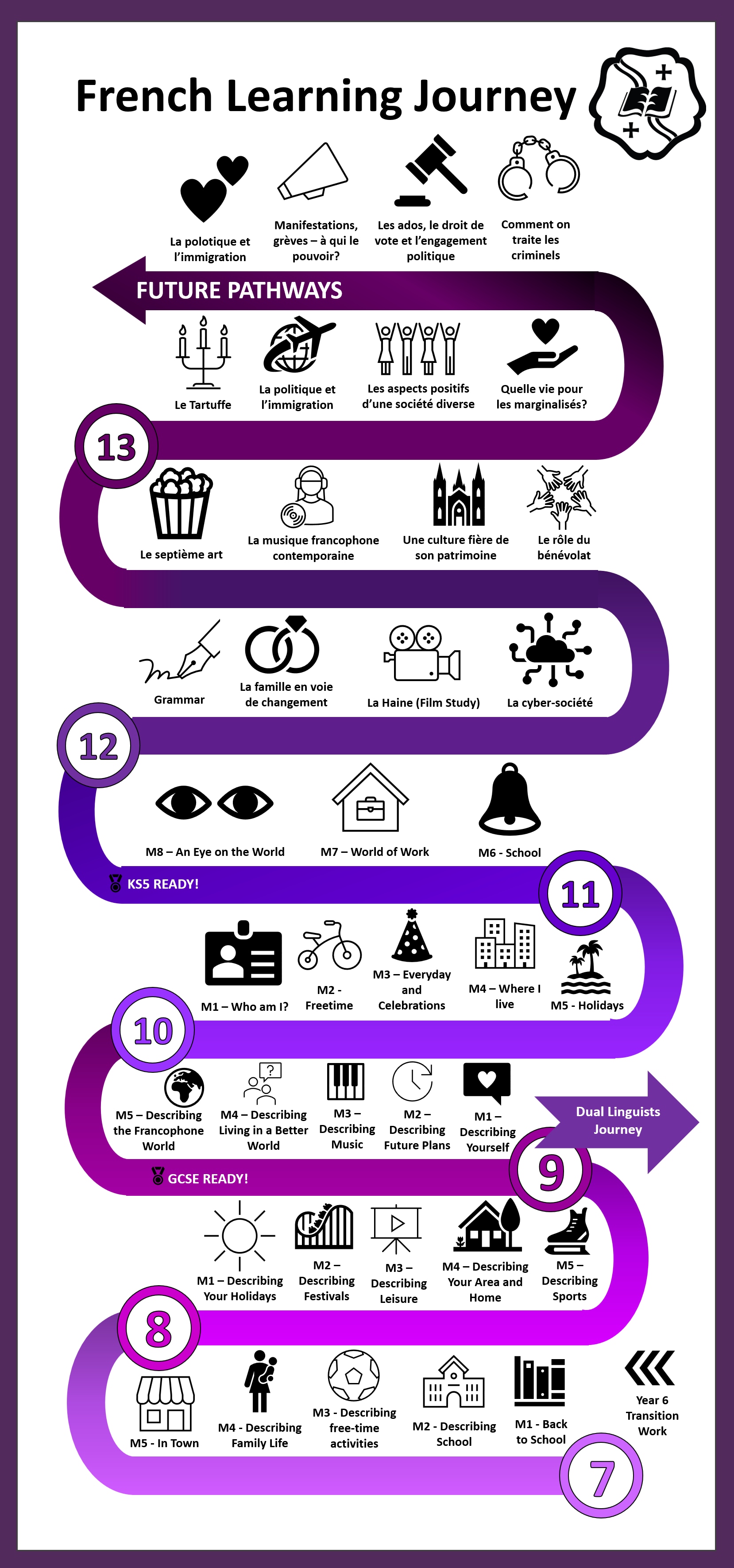We aim to create global citizens with the
curiosity to travel and interact with people from cultures other than our own.
Students will develop an awareness of how language works and will widen their
understanding, knowledge and use of a range of language competencies in a range
of contexts. As students become more competent and independent, they will
foster transferrable skills including communication, critical thinking,
research and creativity.
The language programme of study will focus on developing the breadth and depth of pupils’ competence in listening, speaking, reading and writing, based on a sound foundation of core grammar and vocabulary. The grammar is a key skill as students’ progress in to GCSE.

The course aims to ensure that all pupils understand and respond to spoken and written language from a variety of sources. It will enable students to speak with increasing confidence, fluency and spontaneity, finding ways of communicating what they want to say. Student will also be capable of writing at varying length, for different purposes using the variety of grammatical structures that they have learnt.
Exam Board: Edexcel
Qualification Title: French
Qualification Specification Code: 1FRO
Qualification Webpage: Click here to visit the Edexcel webpage for the specification.
Learning a foreign language is a liberation from insularity and provides an opening to other cultures. A high-quality language education should will develop curiosity and deepen your understanding of the world. It will also provide opportunities for you to communicate for practical purpose and equip you to study and work in other countries.
You will need to have studied this language at school before in order to continue it to GCSE.


The MFL GCSE consists of four externally examined papers based on the following skills: listening, speaking, reading and writing.
Paper 1: Listening and understanding in French (Foundation tier or Higher tier).
Paper 2: Speaking in French (Foundation tier or Higher tier).
Paper 3: Reading and understanding in French (Foundation tier or Higher tier).
Paper 4: Writing in French (Foundation tier or Higher tier).
• Translator
• Interpreter
• Broadcast journalist
• Diplomatic service officer
• English as a foreign language teacher
• International aid/development worker
• Logistics and distribution manager
• Marketing executive
• Private tutor
• Sales executive
• Secondary school teache
r
The course has been
designed to give a profound understanding of French. Not only will you
understand more about the mechanics of the language (grammar, vocabulary), but
also how people live and use language on a daily basis. All this will be taught
by looking at newspapers, books, magazines, television, film and, of course,
textbooks. You will do some work in our language laboratory and will also have
one hour per week of intensive speaking work with the French assistant.
The topics covered
include current trends, issues in society, artistic culture in the
French-speaking world, aspects of political life and literary texts and films.
The cultural works studied will be Le Tartuffe by Molière and Le Haine by
Mathieu Kassovitz
The A-level curriculum builds on the knowledge, understanding and skills gained at GCSE. It constitutes an integrated study with a focus on language, culture and society. It fosters a range of transferable skills including communication, critical thinking, research skills and creativity, which are valuable to the individual and society. The content is suitable for learners who wish to progress to employment or to further study, including a modern languages degree. The approach is a focus on how French/Spanish-speaking society has been shaped socially and culturally and how it continues to change. In the first year aspects of the social context are studied, together with aspects of the artistic life of Spanish-speaking countries. In the second year further aspects of the social background are covered, this time focusing on matters associated with multiculturalism. Students also study aspects of the political landscape including the future of political life in the French/Hispanic world by focusing on young people and their political engagement. Students will develop their knowledge and understanding of themes relating to the culture and society of countries where French/Spanish is spoken, and their language skills. They do this by using authentic spoken and written sources in Spanish. The literary texts and films studied offers opportunities to link with the themes. In Spanish the play La casa de Bernarda Alba is linked to the sub-theme Modern and Traditional Values while the film El laberinto del fauno is connected to the sub-theme Monarchies and Dictatorships. In French Tartuffe is linked to the sub-theme of Political Life, while La Haine is linked to aspects of Politics and Immigration.
They appreciate, analyse and become able to respond critically in writing in French/Spanish to the work they have studied, including a critical appreciation of the concepts and issues covered and a critical and analytical response to features such as the form and the technique of presentation.
Through the Individual Research Project, learners develop research skills in French/Spanish, demonstrating the ability to initiate and conduct individual research on a subject of personal interest, relating to the country or countries where French/Spanish is spoken.
Exam Board: AQA
Qualification Title: French
Qualification Specification Code: 7652
Qualification Webpage: Click here to visit the AQA webpage for the specification.
Standard Sixth Form entry requirements

Languages can be
studied as a standalone subject or as a combined degree with a huge variety of
subjects, including Business, Mathematics, Economics, Law and International
Relations. It is possible to study one, two or three languages in a degree, and
any language can be studied from scratch or continued from GCSE or A-Level
standard. Language degrees prepare learners for careers related to the subject
such as Translation, Interpretation and Teaching, but are also in demand for
pathways such as Law, International Relations or Banking.
Mr Maurice
Owned by: MDS | Last Published: 20/09/2019 09:53:36 | Next Update: N/A